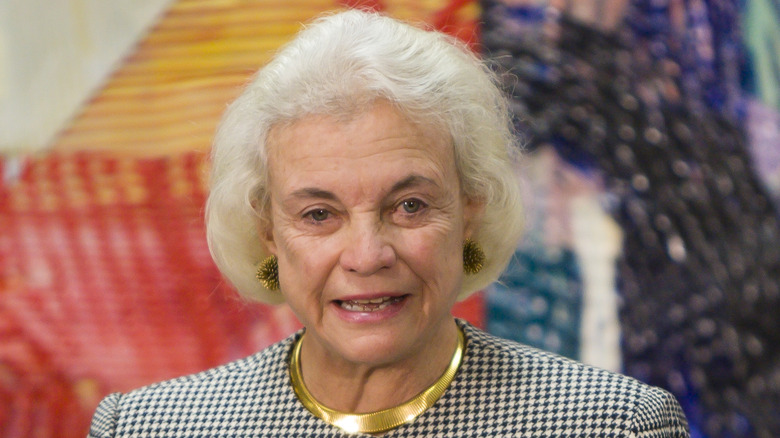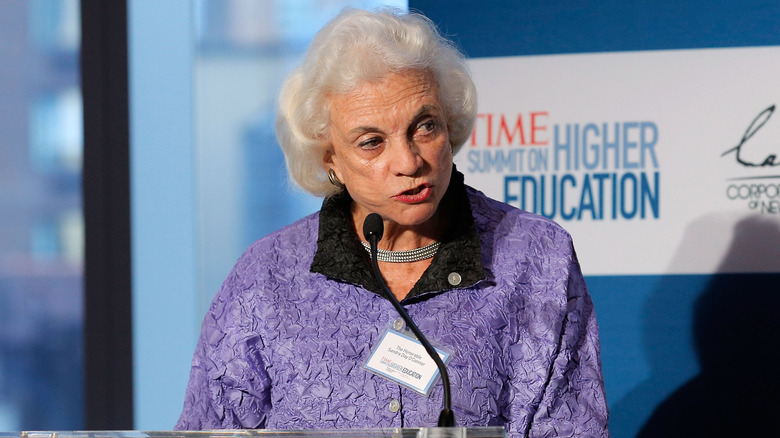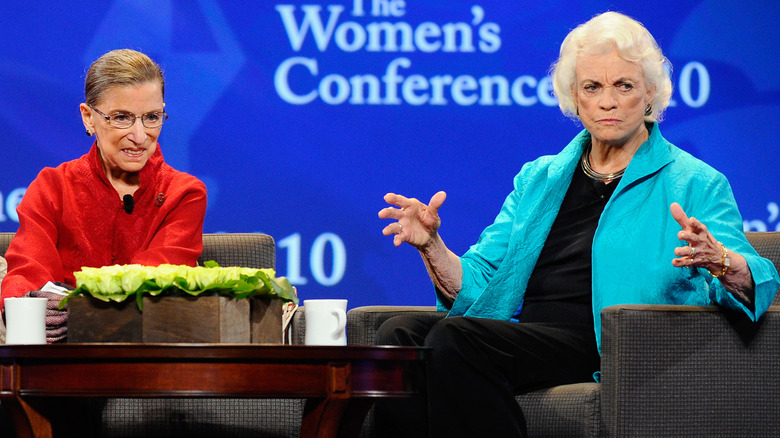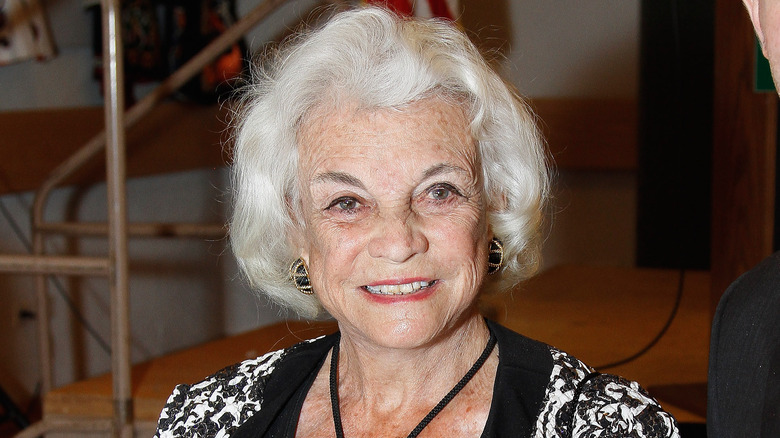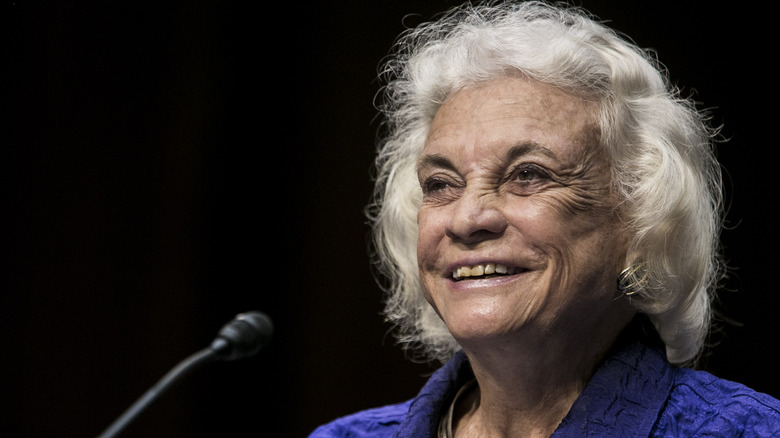How Sandra Day O'Connor Broke The Glass Ceiling
Born into humble beginnings in 1930 in Texas, and raised near Duncan, Arizona, where the family didn't have electricity or running water until she was 7 years old, Sandra Day O'Connor would become one of the most important female figures of the 20th century.
She toted around a gun as a young girl and told Vanity Fair, "Whenever we saw a jackrabbit or a coyote we'd shoot them, because four jackrabbits ate as much as one cow." She went to private school and eventually enrolled at Stanford University in 1946. At the time, less than 4% of women had a college degree, per Statista. She stayed at Stanford to complete her law degree and worked for free at her first job because no one would pay her.
"I called at least 40 of those firms asking for an interview, and not one of them would give me an interview ... they said, 'We don't hire women,' and that was a shock to me," Day O'Connor said in a 2013 interview with Fresh Air (via NPR).
When her husband John Jay O'Connor III was drafted to Germany, Day O'Connor followed and worked as a civil attorney for the Army (via Britannica). After returning from abroad, she was appointed to fill a vacancy in the Arizona Senate in 1969 by the governor, per the Washington Post.
While these were major strides for a woman at the time, these were just baby steps to what Day O'Connor would accomplish before her death on December 1, 2023.
She was the first female justice on the US Supreme Court
In 1981, having promised to put a woman on the Supreme Court, President Ronald Reagan nominated Sandra Day O'Connor.
"I was working in my office on the Arizona Court of Appeals," Day O'Connor told Fresh Air (via NPR). "I was at the court in my chambers when the telephone rang. And it was the White House calling for me, and I was told that the president was waiting to speak to me. That was quite a shock, but I accepted the phone call, and it was President Reagan, and he said, 'Sandra?' 'Yes, Mr. President?' 'Sandra, I'd like to announce your nomination to the U.S. Supreme Court tomorrow. Is that all right with you?' Well, now, that's kind of a shock, wouldn't you say?"
Day O'Connor's nomination was confirmed by the Senate 99 to zero, making her one of only five justices to be unanimously confirmed in the 20th century, per Senate.gov. She served from 1981 to 2006. In 1993, she was joined by the second female justice to be confirmed to the US Supreme Court, Ruth Bader Ginsberg. Upon RBG's confirmation, O'Connor remarked that she was relieved to no longer be the only woman on the bench, per C-SPAN.
She proved to be unlike her fellow Republicans
Contrary to being a GOP member, Day O'Connor proved time and again that her allegiance was to the Constitution rather than her party. Per the National Women's History Museum, she became known for her swing votes. She voted with Democrats on abortion rights and to uphold Roe V. Wade — affirmative action, and other social topics, per ABC News. However, she still remained fiscally conservative and always voted in favor of protecting the Second Amendment.
During her SCOTUS tenure and afterward, Day O'Connor received dozens of awards and honors — from being awarded the U.S. Presidential Medal of Freedom in 2009, to having September 25 named after her by Arizona Governor Doug Ducey.
When Day O'Connor retired from SCOTUS in 2006, citing her husband's battle with Alzheimer's, she'd broken countless glass ceilings. In 2018, when she announced her own Alzheimer's, Chief Justice Roberts called her a "role model not only for girls and women, but for all those committed to equal justice under law" and Justice Ruth Bader Ginsberg said of Day O'Connor, "She strived mightily to make what was momentous for women in 1981 ... no longer extraordinary, but entirely expectable. I am among legions of women endeavoring to follow her lead," (via The New York Times).
Sandra Day O'Connor remembered as an inspiration
Sandra Day O'Connor referred to herself as an "Arizona cowgirl," and in the wake of O'Connor's death, a number of Arizona politicians have spoken out on social media about her legacy. One such politician was Phoenix mayor Kate Gallego, who posted on X, formerly known as Twitter, in honor of the late justice. "With her unique grit, O'Connor took any 'no' she got and turned it into a 'watch me!' — leading her all the way to the Supreme Court," she wrote. Kimberly Yee, Arizona state treasurer and former Arizona state senator said, "She was an inspiration to me and women around the world," via X.
Cindy McCain, wife of the late Arizona senator John McCain wrote a short but sweet tribute to O'Connor on X: "Sandra Day O'Connor was an Arizonan and American trail blazer. A force of nature whom John and I were lucky to call our friend."
Of course, O'Connor's death was also noted by others besides politicians outside her home state. "Justice Sandra Day O'Connor was often the key vote in defending the rights of Americans—in protecting clean air, in protecting women's rights, in protecting against discrimination, in protecting voting rights." Chuck Schumer, current Senate majority leader, wrote on X. Susan Collins, a Republican senator from Maine, posted to X, in honor of O'Connor. "She was a trailblazer and a role model for girls and women. She exemplified excellence in public service," she wrote.
Sandra Day O'Connor's lasting legacy is of public service
Former president Barack Obama released a statement referring to Sandra Day O'Connor as "like the pilgrim in the poem she sometimes quoted — forging a new path and building a bridge behind her for all young women to follow," via Politico. Tennis star Billie Jean King said that O'Connor "served as a trailblazing inspiration for 25 years," per X.
Sadly, some of O'Connor's major decisions from her time on the court have been rendered moot since her retirement in 2006, perhaps most notably with the overturning of Roe v. Wade in June 2022. It was 30 years earlier during the 1992 Planned Parenthood v. Casey case that O'Connor was a deciding vote in favor of the constitutional right to abortion. In her decision, she said that while "some of us as individuals find abortion offensive to our most basic principles of morality ... that can't control our decision." She also noted that the court should act in such a way as "to define the liberty of all, not to mandate our own moral code."
But even with the change to some of O'Connor's historic court decisions, she clearly stood out as an inspiration and someone who was dedicated to public service. She spoke about a focus on public service during her commencement speech in 2004 at Stanford. "Our nation needs bridges, and bridges are built by those who look to the future and dedicate themselves to helping others," she said.
